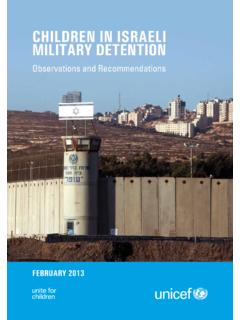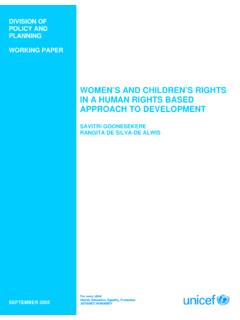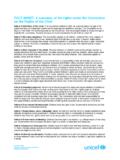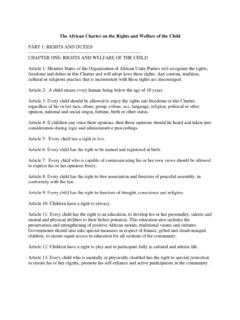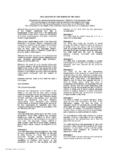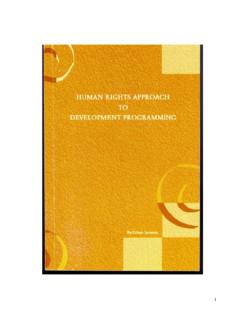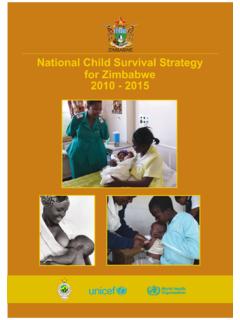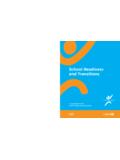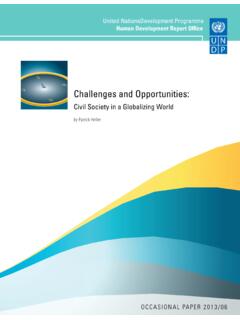Transcription of Review Article - UNICEF
1 World Politics55 ( July 2003), 579 606 Review ArticleTRANSNATIONAL civil SOCIETYAND ADVOCACY INWORLD POLITICSBy RICHARD PRICE *Susan Victories: How Activists Provoke Multilateral , : Cornell University Press, 2001, 186 Marie of Conscience: Amnesty International and ChangingHuman Rights Norms. Princeton: Princeton University Press, 2001, 183 Forces: The Transnational Movement to End theCold War. Ithaca, : Cornell University Press, 1999, 406 Florini, Third Force: The Rise of Transnational civil Washington: Japan Center for International Change and Carnegie En-dowment for International Peace, 1999, 295 Higgott, Geoffrey Underhill, and Andreas Actorsand Authority in the Global System. New York: Routledge, 2000, 301 Keck and Kathryn beyond Borders: Advocacy Networksin International Politics. Ithaca, : Cornell University Press, 1988, 227 Khagram, James V. Riker, and Kathryn Sikkink, Politics: Transnational Social Movements, Networks, and Norms.
2 Min-neapolis: University of Minnesota Press, 2002, 366 powerful is transnational civil society ? How sustainable is itsinfluence? How desirable is that influence? Thus Ann Florini (p. 5) encapsulates the important questions motivating not only herown edited volume but also a plethora of other recent works by inter-national relations scholars examining the flowering of transnational ad-vocacy. What then are the principal responses of this literature to theseand other central questions? How does this most contemporary roundof research deal with previous criticisms of earlier work?This Review Article considers the above volumes to take stock of con-temporary research on the role of transnational civil society advocacy in* The author thanks Christian Reus-Smit, Lisa McIntosh Sundstrom, Katherine Morton, and threeanonymous reviewers for their helpful comments on earlier drafts of this 11/18/03 12:53 PM Page 579world argue that this body of work contributes to a progres-sive research agenda that has met with a number of successive criti-cisms.
3 In the process new areas of inquiry have opened up, includingthe need to afford a central place to normative international theory. Ialso contend that the focus of this research on the transnationalizationof civil society provides a trenchant response to an important puzzleconcerning the leverage of civil society vis- -vis the contemporary statein an era of globalization. Further, the liberal variant of transnationaladvocacy research constitutes a powerful theoretical counter not only toother nonliberal theories that privilege other agents or structures butalso to other varieties of contemporary liberal international theory, suchas those privileging preexisting domestic preference formation or state-centric versions of liberal WHATAREWESTUDYING?Numerous terms are used to denote phenomena under considerationhere nonstate actors, nongovernmental organizations (NGOs),transnational advocacy networks, transnational or global civil society ,and so on.
4 Khagram, Riker, and Sikkink usefully distinguish betweentransnational networks, coalitions and advocacy campaigns, and socialmovements, which respectively involve informal transnational contacts,coordinated tactics, and the mobilization of large numbers of people inprotest (p. 7). civil society in general is commonly employed to refer toa third system of agents, namely, privately organized citizens as dis-tinguished from government or profit-seeking actors. Transnationalcivil society (TCS), the term employed by Florini, serves as an umbrellaterm in this Article . It refers to self-organized advocacy groups that un-dertake voluntary collective action across state borders in pursuit ofwhat they deem the wider public interest. Besides being distinguishedfrom other transnational agents like private economic actors or govern-ment authorities institutionally empowered by the state, the term civilsociety denotes how they are also distinguished from other transna-tional actors whose prominence has of course exploded on to the globalagenda with the terrorist attacks of September 11, 2001.
5 Unlike terror-ists and other transnational criminals (who might be said to representelements of uncivil society ), these actors eschew the deployment ofarmed violence for their ends. This makes their influence all the more580 WORLD POLITICS1 It does so with the important proviso that the works under consideration are but a few of numer-ous other recent works in this 11/18/03 12:53 PM Page 580of a puzzle, and it is this feature that animates the contemporary re-search program on transnational civil society . If you are a private citi-zen who wants to effect change in world politics without becoming amember of an armed group and resorting to violence, is there anythingyou can do?The introductory essay of the Higgott, Underhill, and Bieler volumetakes sensible notice of the difficulty in differentiating many private ac-tors from states and state policy processes (p. 6). Such difficulties areparticularly striking in Evangelista s analysis of Soviet scientists, whocould not be considered private citizens, since in the socialist USSR they were all in the employ of the government.
6 Rather than an analyt-ical inconvenience, however, this is a tenet of the Gramscian school ofinternational relations that there is no such thing as civil society in-dependent from state and corporate power. The Gramscians see civilsociety as intertwined in a hegemonic historic bloc. Although the Hig-gott, Underhill, and Bieler volume sets out to explore the plausibility ofthe Gramscian thesis, a number of the case studies presented therein donot support the sweeping assertions that civil society has been co-optedby the state or that the power of multinational corporations invariablycarries the day in the era of hardly closing thedoor on the issue, such findings reinforce the utility of thinking oftransnational activists in terms of the civil society WHATDOTHEYDO ANDHOWDOTHEYDOIT?A primary task of this research has been to establish that transnationalcivil society matters. Indeed the case studies in the volumes under re-view often take on some least likely cases and provide an abundance ofpowerful empirical evidence of the transnational vitality of the civil so-ciety sector.
7 This evidence challenges the hegemonic pretensions of thechief theoretical contenders that privilege other agents or structures inworld politics, such as the realist or neoliberal emphasis on the pre-dominance of the state and the emphasis on the structural power ofcapitalism in an era of has TCSaccomplished that would not have happened other-wise? Much, as evidenced in these works. Evangelista marshals path-TRANSNATIONAL civil SOCIETY5812 See the following in Higgott, Underhill, and Bieler: David Levy and Daniel Egan, Corporate Po-litical Action in the Global Polity: National and Transnational Strategies in the Climate Change Ne-gotiations ; Andrew Walter, Globalisation and Policy Convergence: The Case of Direct InvestmentRules ; Elisabeth Smythe, State Authority and Investment Security: Non-State Actors and the Ne-gotiation of the Multilateral Agreement on Investment at the OECD ; and Jochen Lorentzen, ForeignCapital, Host-Country-Firm Mandates and the Terms of Globalisation.
8 11/18/03 12:53 PM Page 581breaking research to advance no less than the claim that transnationalscientists prepared the ground for the peaceful end of the cold warthrough their peace activism on behalf of arms control issues includingmissile defense, nuclear testing, and conventional forces. His relentlessattention to detail provides solid basis for his profoundly importantclaims that the long-term education project (p. 38) of scientists even-tually paid off, given that the goal was to prevent global nuclear war be-tween the and the USSR. As he states, The transnationalnetworks that have sought since the 1950s to tame the Russian bear bypromoting disarmament and respect for human rights were ultimatelysuccessful (p. 390). While it may be difficult to top the assertion thatprivate citizens saved the world, the collective significance of the othercase studies is that they tackle some of the most important and mostvisible goings-on in world politics and show that it is private citizens act-ing across borders who are front and center in the evidence accountingfor outcomes.
9 These include the end of state repression and atrocitiesin El Salvador and Guatemala (Burgerman), the halt to individual damprojects affecting millions around the world (Khagram, in Florini) or little victories such as the simple realization that the man or womanconcerned is not forgotten has often resulted in the prisoner receivingbetter treatment and an improvement in his conditions (Clark, 6).Nonetheless, it is no small puzzle that TCShas managed to achieveimportant effects, since civil society actors typically do not have at theirdisposal the military or economic power associated with governmentsand corporations (Sikkink, in Khagram, Riker, and Sikkink, 303;Florini, 10); nor do they deploy the violence that has been used to dev-astating effect by transnational terrorists. This by now well-worn tru-ism routinely invoked to set up the puzzling nature of activistinfluence does have its limits and can now usefully be explored. Forone, activists themselves can wield substantial financial power throughtactics such as consumer , some private groups whether the National Rifle Association or organizations advocating ac-ceptance of the International Criminal Court are well financed bygovernments or corporations or by international organizations, privategroups, or foundations that are important TCSactors in their own of this warrants further research, which may well undercut anyclaims of the autonomous power of civil society , since the grassroots fi-582 WORLD POLITICS3 Rebecca Johnson, Advocates and Activists: Conflicting Approaches on Nonproliferation and theTest Ban Treaty, in Florini, 66.
10 Elizabeth Donnelly, Proclaiming Jubilee: The Debt and StructuralAdjustment Network, in Khagram, Riker, and Sikkink, 11/18/03 12:53 PM Page 582nancial support of groups like Amnesty International seems to face stiffcompetition from groups funded by a plethora of other the course of establishing that TCSactors do matter, scholars haveproduced a large menu of what such activists do and how do they do and Sikkink usefully summarize the range of goals such actorsseek: to get an issue on the international agenda, to get internationalactors to change their discursive positions and institutional procedures,and to influence policy change and actor behavior (p. 25). Put theoret-ically,TCSactors seek to change not just the interests and identities(and thus practices) of actors but also the environments within whichthose actors operate that is, the structures of power and the typical disadvantage at which such actors operate in terms ofmaterial power, much of the research examines how activists developand promote ideas and international norms to change the policies andpractices of governments, intergovernmental organizations, corpora-tions, and civil society (Florini, 10 11).
